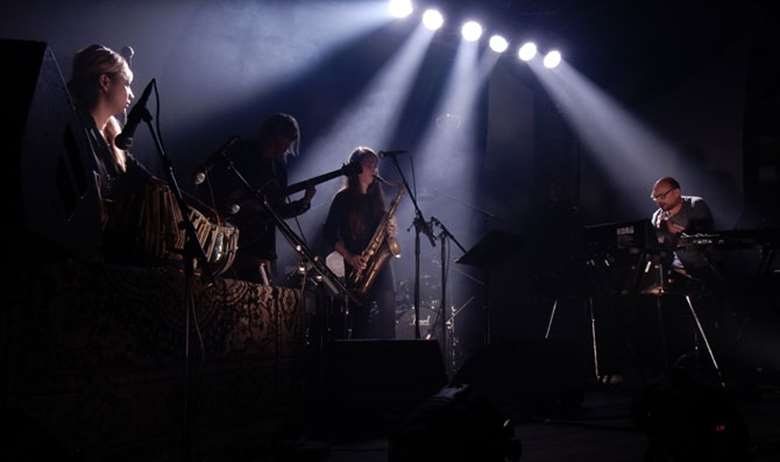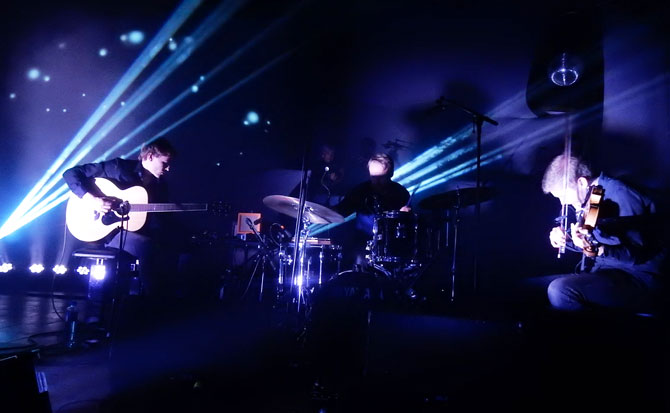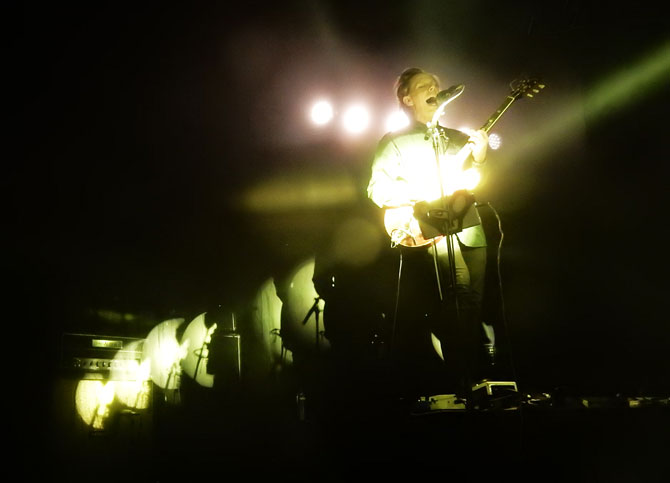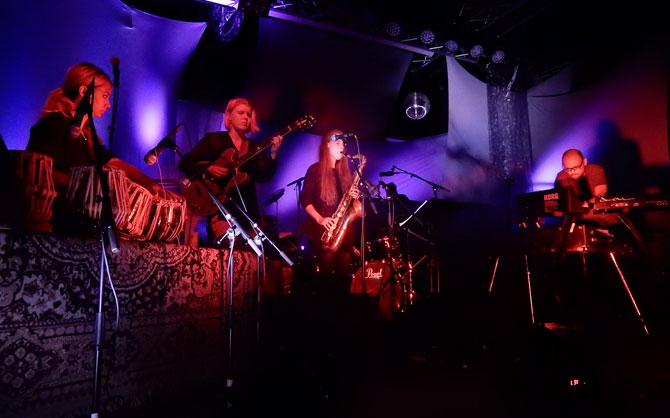Atmosphères, Apneseth, Westerhus and Wesseltoft mix it up for Punkt
Thursday, September 22, 2016
If there was an air of self-congratulation about this year’s Punkt festival then it was entirely justified: now in its 12th year, this ‘small, but perfectly formed’ niche festival in the Norwegian city of Kristiansand looms impressively large on the international scene.

Its reputation largely rests on the quality of the programming and the festival’s unique founding principle that each ‘live’ act is immediately followed by a ‘live’ remix of the music, with anything from a solo producer to another band emerging at the back of the stage.
This process is deliberately very open-ended, as festival co-curator Jan Bang explained to Fiona Talkington in an interview on the opening night, and indeed would prove so over the next two days. It also lends itself to an eclectic programme, since each act is both a performance and a source of stimulation for the remixers. Thus the 2016 line-up included elements of Norwegian traditional music, hard-hitting jazz, post-rock, ambient soundscapes, pure improvisation and even a pop act straight from the Norwegian charts. Both Ingfrid Breie Nyhus’ piano and Hardanger fiddle virtuoso Erland Apneseth root their music in the distinctive phrasing and rhythms of Norwegian folk music, but where Nyhus’ compelling solo exploration had a careful unravelling of repetitive phrasing and a studied harmonic discipline that was almost academic, Apneseth’s trio with drums and acoustic guitar built similar elements into something altogether more rowdy and rocking, with incessant guitar and rolling drums more than justifying the flashing light show and smoke machine embellishing it.

Nyhus was the opening performer in the highly formal setting of the Klubben gentleman’s club on Thursday, followed by the playful improvisation duo Streifenjunko, who used trumpet, tenor sax and electronics to create an endlessly inventive soundworld. Rarely using their instruments conventionally, they wove a bewildering range of vocalisations and percussive effects around a steady rhythmic evolution that provided remixer Erik Honoré (the other co-curator of the festival) with the basis for a thick electronic restaging of their piece, taking the ideas into a bleaker industrial place and allowing them to flourish into something compelling and affirmative. It was a much more satisfying pairing than that offered to Ingfrid Breie Nyhus, whose piece was followed by what seemed to be an entirely autonomous electronic performance from Jon S Lunde and Morton Liene, onto which they had awkwardly grafted a closing coda sampled from her performance.
Saturday’s proceedings moved to the much less formal nightclub venue Kick Scene, allowing for a two-tier stage setting with the remixers set up behind the live band: a particularly dynamic arrangement for Erland Apseneth’s set with a trio of Stian Westerhus, Arve Henriksen and oud-player Rolf Lislevand assembled in waiting. Accompanied by vivid projections and moody lighting, they did a great job of adding deeper resonances to the Norwegian themes, Henriksen’s trademark siren-call trumpet nicely bridging the gap between Scandinavian fiddle and Arabic oud. It was a distinct contrast with what followed: to judge by the response of the people sitting next to me Band of Gold are a bona fide pop sensation in their home country, and their demeanour suggested they belonged on much bigger stages. The music was brash and direct, too, mostly four-to-the-floor rockers with an oddly retro feel of early 1970s Fleetwood Mac, all driven by the ferociously busy bass of Elephant9’s Nikolai Haengsle Eilertsen and fronted by Nina Elisabeth Mortvedt’s assured rock-chick delivery. The brilliant remix, by ‘cosmic Balearics’ Mungolian Jetset was a proper dancefloor number, vocal samples given sub-bass resonances, lyrics slowed down and the beats weighted against chattering live drumming to build a powerful contemporary groove.

The insistence of the remix paved the way perfectly for the final live act: the UK’s Three Trapped Tigers kicked straight into their trademark hard rock wall of sound, each number a construction of riffs and dynamics launching surprisingly disciplined solos and letting loose cheeky drops – Rage Against The (Soft) Machine? It was properly electric and electrifying, cramming an immense amount of music and energy into 45 minutes, and the remix trio of Jan Bang, Auden Klieve and Band of Gold’s bass man Eilertsen were gifted a groove which they stripped away and rebooted with samples into a Friday night variant that finally slid away in the back seat of Kraftwerk’s tour bus.
If Saturday saw a final triple bill that would eventually culminate in something the uninitiated might recognise as jazz in headliner Bugge Wesseltoft’s newest band it began very much in rock god territory with guitarist Stian Westerhus’ solo set. From the start he looked imposing: raised on a small plinth, surrounded by a complex ring of pedals, underlit to emphasise his deranged hair and shadowed eyes, he launched into songs from this year’s Amputation album, building the dark and forceful music behind his fluting falsetto vocals. It was powerful, visceral stuff, somehow managing the balance between increasingly impassioned singing and storming noise-rock freedom and the technical dexterity needed to control the sounds and structures. At times it was as though his roaring voice was what triggered the guitar, at others the electronics seemed to have a life of their own. Combined with the high-energy lighting and projections it was not for the fainthearted and remixer Eric Honoré wisely chose to distil the music, adding Moroder-style sub-bass and tentative saxophone textures, with snatches of vocals emerging in a more refined version that reduced to a closing choral payout.
The festival’s one disappointment had been the cancellation of an appearance from ECM’s Manfred Eicher that afternoon, but his presence was clearly felt in the set from the Atmosphères band that followed, Tigran Hamasyan’s all-star quartet with Arve Henriksen, guitarist Eivind Aarset and Jan Bang playing spacious explorations based on traditional Armenian melodies. With four players with nothing to prove, the sense of relaxed economy and reflective interaction was palpable, producing moments of spell-binding beauty as well as sudden shifts in tone and texture. Nothing jarred in their set, yet an ongoing sparring between the electronics and acoustic sounds gave a creative tension that produced the occasional wry smile onstage. The music’s ethereal integrity presented a challenge to remixer Simen Løvgren who felt his way into it from a fairly urban insistence, hinting at piano and muted trumpet, adding a bassline that became a heartbeat around which the sound coalesced.
Serious stuff, then, but the evening ended on a much more straightforward, joyous note, with the latest incarnation of Bugge Wesseltoft’s New Conception of Jazz band. Twenty years after that group’s album was released, the Jazzland label founder has begun an entirely new ensemble with four young musicians and his own brand of youthful energy to urge them on. This was fun jazz in the Wesseltoft style, combining tight rhythms on drums and table, with intricately written parts for sax and guitar, all held together by the man himself behind his keyboards. Each player got at least one chance to solo, with Marthe Lea’s mature tenor sax especially impressive, while drummer Siv Øyunn Kjenstad did well to stay locked into Wesseltoft’s combination of playful funk and edgy whimsy. There was a quirky Zappa-recalling song about buying stuff to help the economy that nicely combined structure, freedom and a free jazz interlude led by a tabla/sax double solo that gave an idea of how skilled these young players are and how this new band could develop over time. It was a great way to end the festival but, being Punkt, it couldn’t do that because there had to be a remix that almost inevitably felt like a slightly damp squib as some people left before the end.

Notwithstanding that, however, there was no doubt that this had been a great event overall that showed both the Punkt concept and the Norwegian jazz scene remain vibrant at the centre of European jazz development.
– Tony Benjamin (Story & Photos)